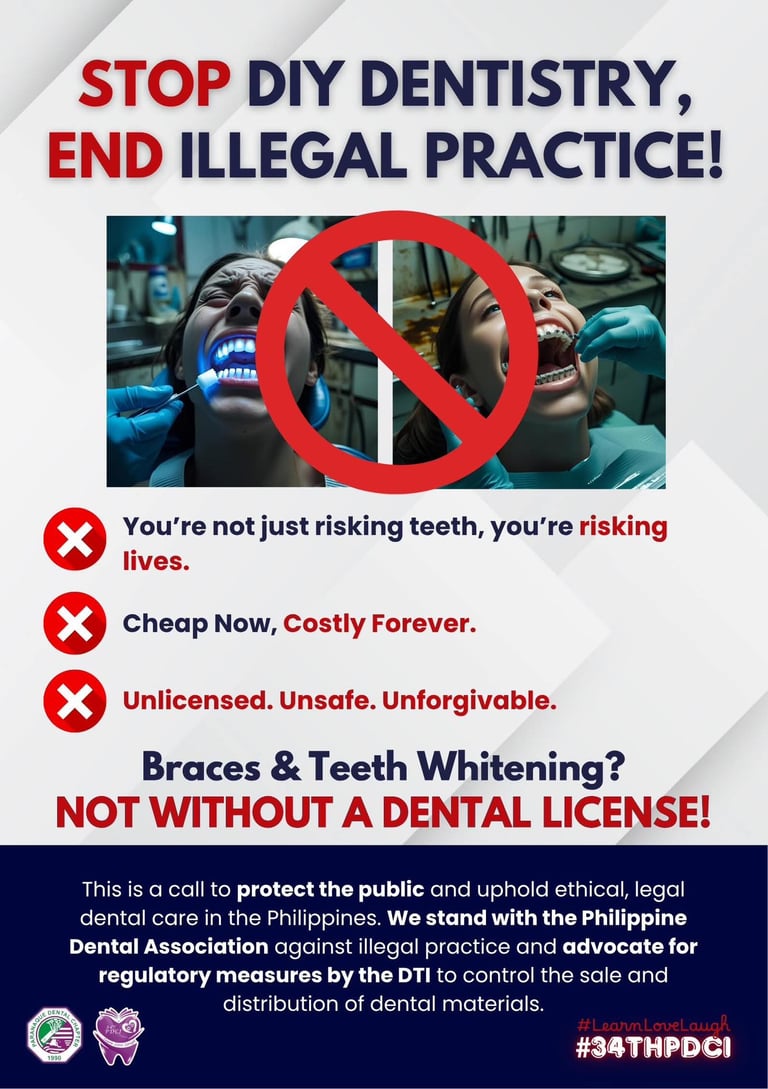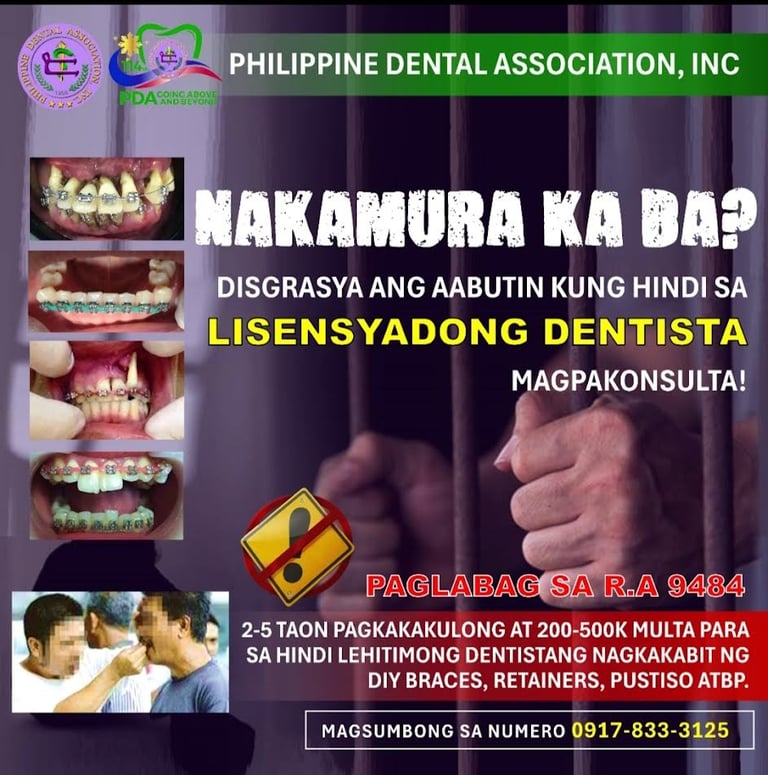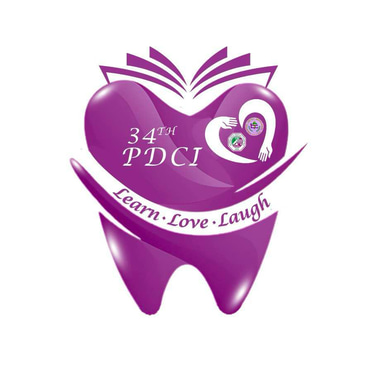Anti-Illegal Practice Drive
𝐀 𝐂𝐚𝐥𝐥 𝐭𝐨 𝐏𝐫𝐨𝐭𝐞𝐜𝐭 𝐭𝐡𝐞 𝐏𝐮𝐛𝐥𝐢𝐜 𝐚𝐧𝐝 𝐔𝐩𝐡𝐨𝐥𝐝 𝐎𝐮𝐫 𝐏𝐫𝐨𝐟𝐞𝐬𝐬𝐢𝐨𝐧


𝐓𝐡𝐞 𝐏𝐃𝐀 - 𝐏𝐚𝐫𝐚𝐧̃𝐚𝐪𝐮𝐞 𝐂𝐡𝐚𝐩𝐭𝐞𝐫 𝐬𝐭𝐚𝐧𝐝𝐬 𝐟𝐢𝐫𝐦 𝐚𝐠𝐚𝐢𝐧𝐬𝐭 𝐭𝐡𝐞 𝐢𝐧𝐜𝐫𝐞𝐚𝐬𝐢𝐧𝐠 𝐧𝐮𝐦𝐛𝐞𝐫 𝐨𝐟 𝐢𝐥𝐥𝐞𝐠𝐚𝐥 𝐝𝐞𝐧𝐭𝐚𝐥 𝐩𝐫𝐚𝐜𝐭𝐢𝐜𝐞𝐬 𝐢𝐧 𝐭𝐡𝐞 𝐏𝐡𝐢𝐥𝐢𝐩𝐩𝐢𝐧𝐞𝐬: From self-service teeth whitening salons to unlicensed individuals placing orthodontic appliances and bleaching products.
Recently, there has been a concerning 𝐫𝐢𝐬𝐞 𝐢𝐧 “𝐝𝐨-𝐢𝐭-𝐲𝐨𝐮𝐫𝐬𝐞𝐥𝐟” 𝐨𝐫 “𝐬𝐞𝐥𝐟-𝐬𝐞𝐫𝐯𝐢𝐜𝐞” 𝐝𝐞𝐧𝐭𝐚𝐥 𝐩𝐫𝐨𝐜𝐞𝐝𝐮𝐫𝐞𝐬 gaining traction across the country. These may appear affordable or convenient, but without proper diagnosis and supervision by a licensed dentist, they pose serious risks to patients’ oral and overall health.
𝐍𝐨𝐭 𝐞𝐯𝐞𝐫𝐲𝐭𝐡𝐢𝐧𝐠 𝐭𝐡𝐚𝐭’𝐬 𝐜𝐡𝐞𝐚𝐩 𝐢𝐬 𝐫𝐢𝐠𝐡𝐭—𝐚𝐧𝐝 𝐫𝐞𝐠𝐫𝐞𝐭 𝐢𝐬 𝐟𝐚𝐫 𝐦𝐨𝐫𝐞 𝐜𝐨𝐬𝐭𝐥𝐲.
The PDA - Parañaque Chapter remains committed to upholding an ethical, legal standard of dental care in the Philippines to protect the public, our patients, and the profession we serve with integrity. We stand with the Philippine Dental Association, Inc. for the continued support and collective action in addressing this issue.
We also respectfully call on the DTI Philippines to help regulate the sale of dental materials. At present, access is open to the general public — making it easier for unlicensed individuals to acquire tools and products used in illegal dental work.
𝐓𝐨𝐠𝐞𝐭𝐡𝐞𝐫, 𝐰𝐞 𝐜𝐚𝐧 𝐫𝐚𝐢𝐬𝐞 𝐚𝐰𝐚𝐫𝐞𝐧𝐞𝐬𝐬, 𝐫𝐞𝐢𝐧𝐟𝐨𝐫𝐜𝐞 𝐫𝐞𝐬𝐩𝐨𝐧𝐬𝐢𝐛𝐥𝐞 𝐩𝐫𝐚𝐜𝐭𝐢𝐜𝐞, 𝐚𝐧𝐝 𝐬𝐚𝐟𝐞𝐠𝐮𝐚𝐫𝐝 𝐭𝐡𝐞 𝐭𝐫𝐮𝐬𝐭 𝐩𝐥𝐚𝐜𝐞𝐝 𝐢𝐧 𝐨𝐮𝐫 𝐩𝐫𝐨𝐟𝐞𝐬𝐬𝐢𝐨𝐧.
Let us work hand in hand to keep oral healthcare safe, evidence-based, in the right hands, and above all, legal.
#AntiIllegalPractice #teethwhitening #braces
#PDCI #ParanaqueDentalChapter #ParanaquedentalChaperInc #34thPDCI #LearnLoveLaugh #DIYbraces #bleaching #bleachingteeth
Pdci is an organization that is committed to ensuring the safety and quality of dental services in the country. It works closely with the relevant authorities to identify and report any illegal or unlicensed practitioners who pose a threat to the public health and the reputation of the dental industry. Pdci aims to eliminate these fraudulent activities and uphold the highest standards of professionalism and ethics in dentistry.
[ REPUBLIC ACT NO. 417, June 18, 1949 ]
AN ACT TO REGULATE THE PRACTICE OF DENTISTRY IN THE PHILIPPINES, AND FOR OTHER PURPOSES. (click Here to Learn More)


STOP Illegal Dental Practice
Illegal dental practitioners pose a serious threat to public health and safety. They operate without proper qualifications, licenses, or standards of care. They may use unsterilized equipment, outdated or counterfeit materials, or perform procedures beyond their scope of practice. They may also charge exorbitant fees, exploit vulnerable populations, or evade taxes and regulations. To stop illegal dental practitioners, the following steps are recommended:
- Educate the public about the risks and consequences of seeking dental care from unlicensed providers. Provide information on how to verify the credentials and reputation of a legitimate dentist.
- Strengthen the enforcement and penalties for illegal dental practice. Increase the frequency and scope of inspections, audits, and investigations. Impose fines, sanctions, or criminal charges for offenders. Seize and destroy their equipment and materials.
- Enhance the collaboration and coordination among stakeholders. Involve dental associations, regulatory bodies, law enforcement agencies, health authorities, and community organizations. Share information, resources, and best practices. Establish referral mechanisms and reporting systems.
- Support the access and affordability of quality dental care. Address the barriers and gaps that may drive some people to seek illegal dental services. Expand the coverage and availability of dental insurance and subsidies. Increase the supply and distribution of qualified dentists and dental hygienists. Promote preventive and primary dental care.
